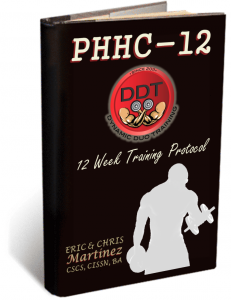By Eric and Chris Martinez-
Time after time we are all making mistakes here and there; after all we are humans at the end of the day. The beauty of making mistakes is the fact that we learn from them and find ways to improve so that it doesn’t happen again.
In part one of our 8 Ways To Improve Your Iron Game we said the article isn’t meant to make your jaw drop or teach you a bunch of new stuff. Well, we are saying it again folks! Instead, look at it as a friendly reminder to start doing some of the small stuff you haven’t paid attention to much. As we continue to learn more, we’re finding that constantly reminding ourselves and others of the small things that ultimately need to be practiced and implemented into the trainee’s iron game for ultimate success. So, if you wish, sit back, booties tight, back straight, and take some notes.
Practice Makes Perfect
Youever heard the famous “Practice” spiel by Allen Iverson? Well we won’t sit here and repeat how many times he said “practice,” but we will sit here and say “practice makes perfect.” Every repetition of every exercise you perform is practice. If you want to improve your performance, you better take those repetitions seriously and execute them in a manner that supports your objectives.
If you want to get really good at squatting, deadlifting, or benching, then every time you execute those lifts you better take it serious because you’re practicing and reinforcing a particular position and movement pattern. The best analogy that we heard regarding this is from Dr. Mike Zourdos, who said “Think about NBA players, if they are terrible at free throws, they’re going to practice daily at free throw shooting to get their percentage up. So, if you want to master the squat, deadlift or bench, you need to continue to practice the movements consistently.”
You can’t really sum it up any better than that. So, if you want to get good at a specific movement in the gym then you need to practice, practice, and practice some more.
It took me years and years of squatting practice to finally reach a 425 pound squat
What to Do Between Sets
If you’re one of those people that just simply can’t rest and do nothing between your sets then we have some suggestions for you:
– Perform stretches for the non-working muscles. For example, say you are hitting chest that day, then stretch your legs out.
– Stretch the muscles that you are working if they are extremely tight. For example, when our clients’ squat, we are constantly having them stretch their hip flexors between sets, as well as goblet squat stretching, this helps keep their muscles loose and allows them to continue to squat deep.
– Get some foam rolling in or do some mobility work.
– Perhaps, work on a small and lagging muscle such as calves or forearms.
– Get your ab work done between sets.
– You can even jump rope between sets to keep your heart rate elevated and burn some extra calories. The bottom line is you can do a lot of things between sets, cut down on time, and get some beneficial work done.
Your Mentality Becomes Your Reality
Mental imagery can be used as a way of improving strength training performance. A new study by Richter et al. shows that the correct use of imagery is to visualize successful outcomes and avoid considering or imagining unsuccessful outcomes. Before entering the gym, be fearless, have positive thoughts about your workout or setting that PR, and be fully immersed in the process. The minute you get in there and think negative, become scared, get distracted, or doubt yourself, we promise you will have a half ass workout or won’t hit the PR. Your mentality becomes your reality!
A week before I hit a 490 deadlift PR, you better believe I used mental imagery.
Carbs, carbs, carbs
You ever heard the song “shots” by Lil Jon? Well, when it comes to pre and post workout carbs, then all we can say is “carbs, carbs, carbs.” The reason being we feel that by partitioning the majority of your total daily carbohydrates around pre and post workout is a game changer. There are several reasons why we think this, let us bust out our dynamic list for you:
– You get an increase in insulin sensitivity by working out so you can more effectively tolerate and utilize carbohydrates post workout so it also makes sense to put more carbs post workout as compared to other times of the day.
– Since insulin sensitivity is also elevated pre workout, it makes sense to get in more carbs to fully top off glycogen stores and have more energy for your workout.
– Helps with tissue leverage. When your stomach is full, it makes it easier to push your abdominal wall against your weight belt, giving you more stability. Great for squats and deadlifts.
– More carbs can lead to more energy, and more energy can lead to a better workout. Especially if you’re dieting and your total carb intake for the day is low, why not put the majority of those carbs pre and post workout to have more energy?
Given these 4 reasons, there is an excellent study by Devkota. et al out of Dr. Layman’s lab at the University of Illinois on partitioning carbs closer to your workouts. Just try it and see what happens.
Actively Train Your Glutes
Instead of getting a bunch of in-direct work from squats and deadlifts, why not try some direct work such as hip thrusts, glute bridges, reverse hypers, and heavy kettle bell swings. Training your glutes directly could potentially have a carryover effect onto compound movements such as squats and deadlifts. For example, heavy barbell hip thrusts allow you to create a hell of a hip hinge, so when you transfer this over to deadlifts, you could potentially lift more because as soon as you get the bar passed your shins you can use that hip hinge that you developed from heavy hip thrusting. There’s no solid data confirming this, but there’s a lot of anecdotal evidence from colleagues and strength and conditioning coaches.
We remember the “Glute Guy” Bret Contreras saying something like “the barbell hip thrust may or may not have a carryover affect onto the deadlift. The key is to just try it and see if your body makes the adaptation to the movement and gets the carry over effect.” All you can do is give it a try, trust us it won’t hurt, especially when the chicas notice your firm booty in them tight jeans.
Warm Up Your Upper Body Properly
We can’t even begin to tell you how many times we see this on a daily basis. People not warming-up. Specifically warming up their upper bodies prior to training; chest, arms, and back. Instead of warming up people just go right to the bench, come on man!
Now, we are not advocating that you sit there and warm up for 30 minutes, but at the very least 15 minutes to get the engine going. We recommend doing some dynamic stretches, static stretches, foam rolling your lat and rhomboid muscles. Or you can go with a quick 2 minute upper body circuit that we recommend trying to get those muscles ready for battle. A great analogy to keep in mind is most of us always let our cars warm-up prior to driving them in the mornings, well same goes for your muscles, joints, ligaments, and all of the above. Bottom line is warm-up your upper body and we promise you your workout will be much more effective.
Train Your Back Muscles More
The first thing that comes to our minds come Mondays is to train chest right? Many people always think pressing movements first rather than pulling movements. Why? Well, probably to walk around with our chests out hoping women will notice. All joking aside, we are not at all saying pressing movements are bad, no matter what we have to incorporate pressing movements into our training regimens. Our problem with this is why the need for so much pressing and not enough pulling movements? Our back muscles are larger than our chest muscles, so clearly that should mean our back muscles need more volume.
We see too many people just killing themselves with pressing movements, when you should be giving your back muscles more attention. Think of a person that suffers from Kyphosis (rounded back) the more pressing they do, the more their shoulders round and eventually they will look like the Hunchback of Notre Dame. Instead this person should be focusing more on pulling movements, especially scapular retraction to correct their posture. So, instead of starting with chest, start with back first. Give your scapulae muscles, thoracic spine, lats, lower traps, and rhomboid muscles the attention they need, the more retraction in your pulling movements, the better it will serve your upper body workouts all around.
No Excuses, Only Solutions
Now this famous slogan of ours pretty much speaks for itself. If you need us to go more in depth on this slogan of ours, please check out No Excuses, Only Solutions! The bottom line here is we all find ways to make excuses, rather than finding solutions. Don’t let what you can’t do stop you from what you can do. No more excuses, no more wasting precious time. This moment is as good a moment as any time to begin doing what matters most. Start exactly where you are right now. Do what you can with what you have right now. Stop over-thinking and start DOING!


